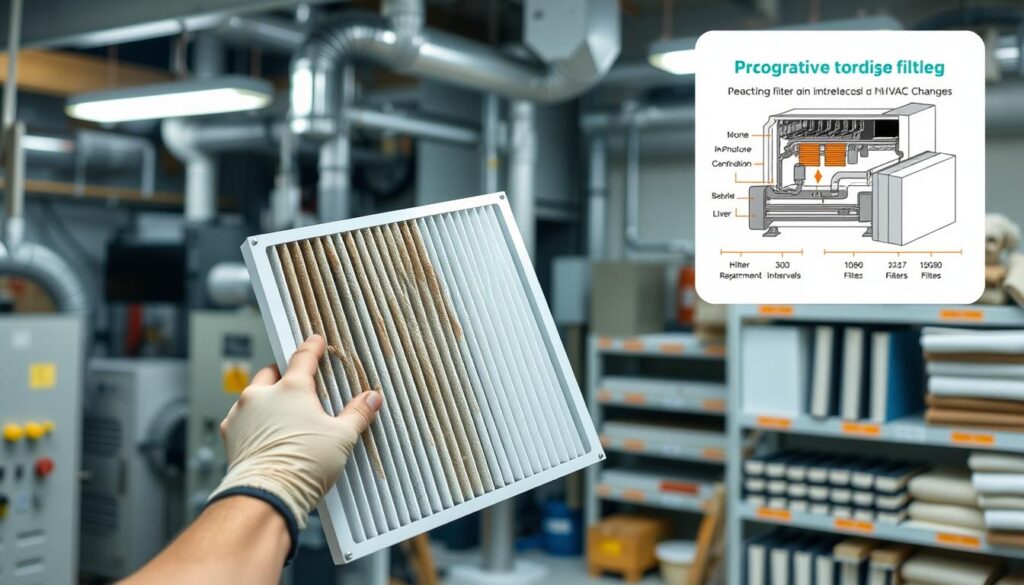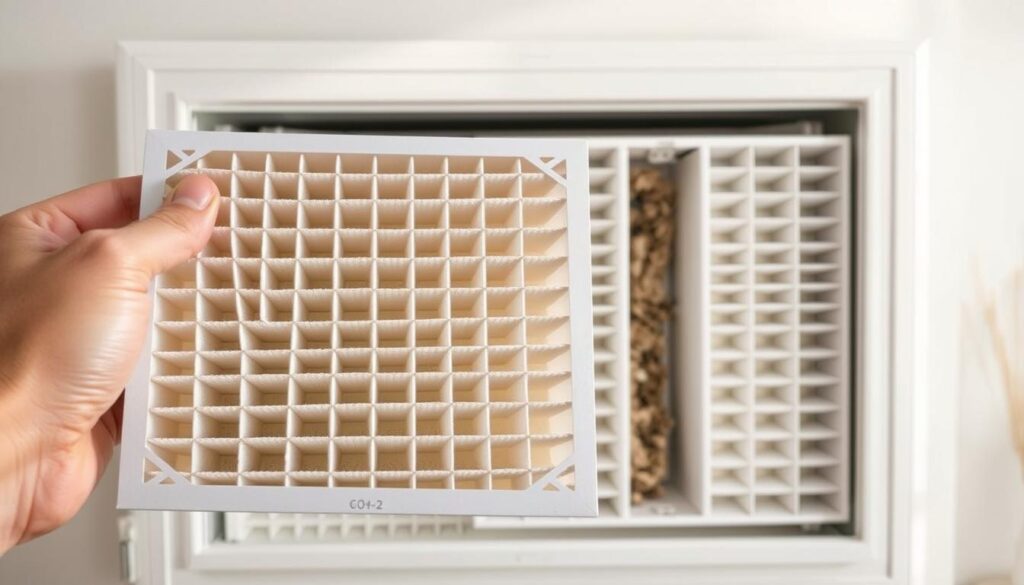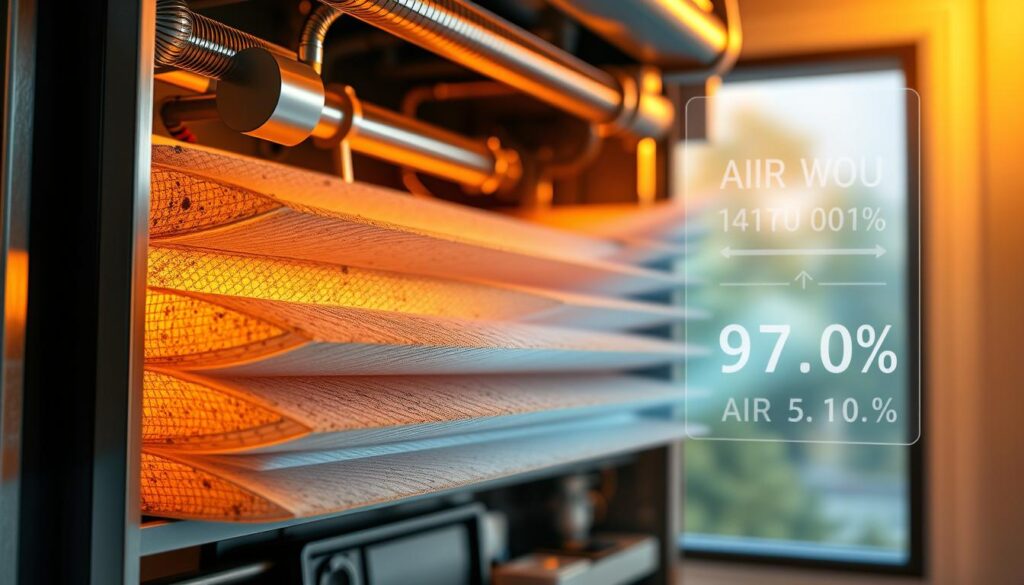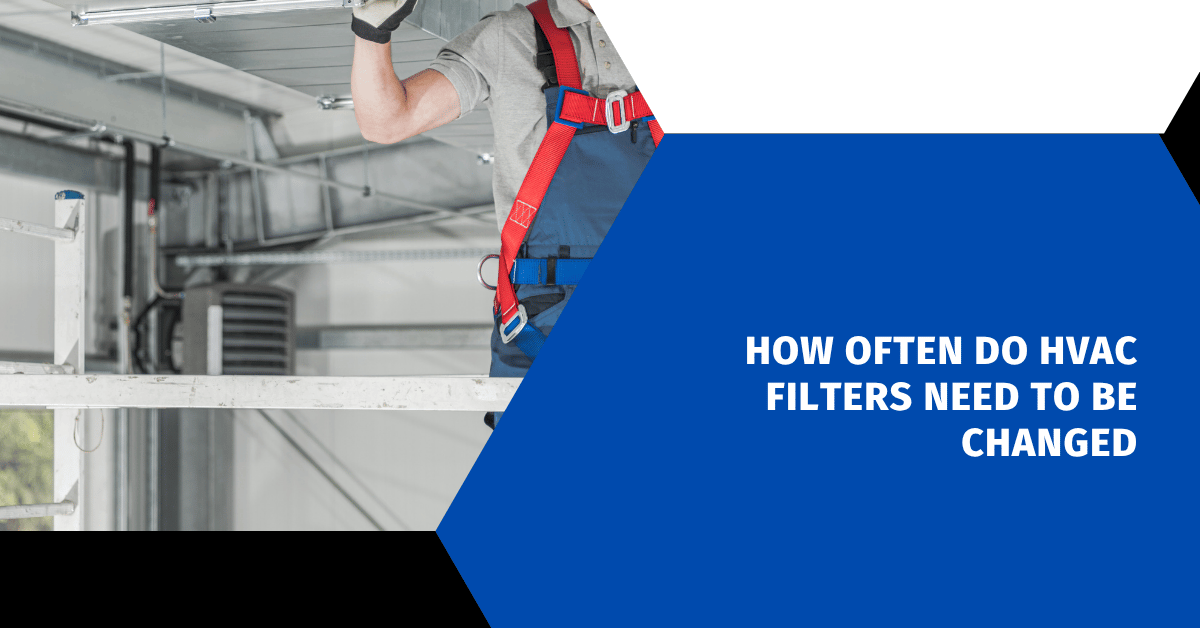Affiliate Disclosure
HVAC Guide Guys is a participant in the Amazon Services LLC Associates Program, an affiliate advertising program designed to provide a means for sites to earn advertising fees by advertising and linking to Amazon.
How Often Do HVAC Filters Need to Be Changed? Ever thought about how long your HVAC filter keeps your home’s air clean? Knowing when to replace your HVAC filter is key to a healthy home.

Experts say to change your HVAC filter every 90 days. But, this rule changes based on your home, pets, and local air. These factors can affect how long your filter lasts.
Keeping your HVAC system running well and your air clean depends on regular filter care. Replacing filters often helps avoid breathing problems, saves energy, and makes your system last longer.
Key Takeaways
- Replace HVAC filters every 90 days on average
- Filter replacement frequency varies by household conditions
- Regular maintenance prevents system inefficiency
- Clean filters improve indoor air quality
- Different home environments require unique filter strategies
Table of Contents
Understanding HVAC Air Filters and Their Purpose
HVAC air filters are key to keeping your home’s air clean and your system running smoothly. They catch dust, allergens, and other particles before they spread through your home.
Your HVAC air filter is more than a simple screen. It’s a complex barrier that keeps your air clean and protects your system. The right filter can greatly improve your home’s comfort and air quality.
Types of HVAC Filters Available
There are various filters to choose from, each with its own level of protection. Here are the main types:
- Fiberglass Filters: These are affordable and disposable, but offer basic protection
- Pleated Filters: They’re better at catching smaller particles
- Electrostatic Filters: Use static electricity to trap contaminants
- HEPA Filters: High-efficiency options for maximum air purification
How Air Filters Protect Your HVAC System
Regular hvac air filter maintenance keeps debris out of your system. Filters stop particles that could:
- Clog air ducts
- Reduce system efficiency
- Increase energy consumption
- Cause premature system wear
The MERV Rating System Explained
The Minimum Efficiency Reporting Value (MERV) shows a filter’s performance. Ratings range from 1 to 16, with higher numbers meaning better air quality. For most homes, a MERV rating between 8-13 is best.
Choosing the right filter is about balancing air quality, system performance, and your specific household needs.
Standard Replacement Guidelines for HVAC Filters
Keeping up with your HVAC filter change schedule is key for your system’s health and air quality. Most experts say to change your filters every 90 days. But, this can change based on a few important factors.
Different air filters last for different times, affecting how long they should last. Here are the usual times to replace them:
- Basic fiberglass filters: Replace every 30 days
- Pleated filters: Replace every 90 days
- High-end media filters: Replace every 6-12 months
“Regular filter replacement is like giving your HVAC system a breath of fresh air.” – HVAC Maintenance Expert
Your air filter change schedule might need to be adjusted. This depends on your home’s size, how many people live there, if you have pets, and the air quality in your area.
| Filter Type | Recommended Replacement | Best For |
|---|---|---|
| Fiberglass | 30 days | Budget-conscious homes |
| Pleated | 90 days | Average household |
| High-MERV Media Filter | 6-12 months | Allergy sufferers |
Regular filter care keeps your HVAC system running well, improves air quality, and might even cut down on energy costs.
Explore Our HVAC Shop
Looking for top-rated HVAC tools, parts, and accessories? Visit our shop and find the perfect solution for your needs.
Visit the ShopFactors That Affect Filter Replacement Frequency
Your HVAC system’s filter replacement schedule isn’t one-size-fits-all. Many factors affect how often you should change your air filter. This keeps your HVAC system running well and lasts longer.
Knowing these key variables helps you create a smart maintenance plan. This plan keeps your home’s air clean and your system running smoothly.
Home Size and Occupancy Impact
The number of people in your home affects filter lifespan. Larger households with more people mean more airborne particles. This means:
- Single-person homes might change filters every 6-12 months
- Families of 4-5 people may need filter changes every 3 months
- Homes with frequent guests require more frequent replacements
Pet Ownership Considerations
Furry friends significantly increase filter replacement frequency. Pet dander, hair, and dust can quickly clog your HVAC filters. This reduces system performance.
- Homes with one pet: Change filters every 60-90 days
- Homes with multiple pets: Replace filters every 20-45 days
- Allergy sufferers might need even more frequent changes
Local Air Quality and Climate Factors
Your local environment is key to filter maintenance. Regions with high pollution, dust, or seasonal allergens need more frequent filter changes. This helps keep your HVAC system efficient.
- Urban areas with high pollution: More frequent replacements
- Dusty regions: Check filters monthly
- Areas with high pollen counts: Consider seasonal adjustments
By monitoring these factors, you can create a personalized filter replacement schedule. This supports prolonging HVAC equipment life and ensures clean, healthy indoor air.
How Often Do HVAC Filters Need to Be Changed

Figuring out how often to change HVAC filters depends on a few important things. While there are general rules, your home’s environment is key to how often you need to replace filters.
Most people should change their HVAC filters every 30 to 90 days. But, this can change based on your situation:
- Standard homes without pets: Every 90 days
- Homes with one pet: Every 60 days
- Homes with multiple pets or allergy sufferers: Every 30-45 days
- Homes in dusty or high-pollution areas: Every 30 days
The type of filter you use also matters. Fiberglass filters need to be changed more often. But, high-quality pleated filters can last longer. Just look at your filter to see if it’s time for a new one.
Experts say to check your filter every month. If it looks dirty, discolored, or clogged, it’s time for a new one. Don’t wait for the recommended time.
Regular filter maintenance protects your HVAC system’s efficiency and indoor air quality.
Changing filters often can save you money on energy, improve air flow, and make your HVAC system last longer.
Signs Your HVAC Filter Needs Immediate Replacement
Keeping an eye on your HVAC system is key. Regular checks prevent damage and save energy. Spotting when to replace your filter can save money and keep your air clean.
It’s important to know when to swap out your filter. Over time, it catches dust, allergens, and more. This can hurt your HVAC’s performance.
Visual Inspection Methods
A simple look can tell you a lot about your filter:
- Hold the filter up to a light source
- Check for visible dust accumulation
- Examine the filter’s color and texture
Performance Indicators
Your HVAC system shows signs if the filter is dirty:
- Reduced airflow from vents
- Uneven heating or cooling
- Increased dust around home surfaces
- Unusual system noises
Energy Bill Changes
A dirty filter can really up your energy use. When it’s clogged, your system works harder. This means higher electricity bills.
| Filter Condition | Energy Efficiency Impact | Estimated Cost Increase |
|---|---|---|
| Clean Filter | Optimal Performance | Baseline |
| Moderately Dirty | Slight Reduction | 5-10% Higher |
| Severely Clogged | Significant Inefficiency | 15-25% Higher |
Pro tip: Replace your filter every 90 days or sooner if you notice these warning signs to maintain system efficiency and indoor air quality.
Explore Our HVAC Shop
Looking for top-rated HVAC tools, parts, and accessories? Visit our shop and find the perfect solution for your needs.
Visit the ShopImpact of Dirty Filters on HVAC System Performance

Ignoring your HVAC filter can lead to big problems. Dirty filters make your system work too hard. This is because they block airflow, making your system less efficient.
Dirty filters cause several major issues:
- They restrict airflow, raising energy use.
- They can’t catch dust and allergens as well.
- They might damage important parts of your HVAC.
- They lower the quality of indoor air.
A dirty filter blocks air flow. Your HVAC system has to work harder to get air through. This means higher energy bills and more wear on parts.
But it’s not just about energy. Dirty filters also can’t catch:
- Pollen
- Pet dander
- Dust mites
- Small pollutants
Keeping your filter clean is key to protecting your HVAC and your family’s health.
Experts say to check your filter every month. Replace it every 60-90 days to keep your system running well.
Choosing the Right Filter Type for Your Home
Choosing the right HVAC air filter is key for your home’s air quality and system performance. The type you pick affects both how well you maintain your HVAC and how long the filter lasts. Knowing the differences between filters helps you make a choice that keeps your HVAC system running well and improves the air inside your home.
Fiberglass vs. Pleated Filters: Pros and Cons
When picking an HVAC filter, you’ll usually see two main choices:
- Fiberglass Filters
- They’re the cheapest option
- They’re thinner and don’t catch as much
- You’ll need to replace them every 30 days
- Pleated Filters
- They filter better
- They catch more dust and allergens
- They can last up to 90 days
Filter Size and System Compatibility
It’s important to pick the right filter size for your HVAC system. The wrong size can make your system work less efficiently and might even damage it. Always check your system’s specs and measure the current filter before buying a new one.
Pro Tip: If you’re unsure, talk to an HVAC expert. They can help you find the perfect filter for your system.
Understanding these filter details helps you keep your HVAC system running smoothly. It also helps you maintain better air quality in your home. This way, you protect your investment in your HVAC system.
Seasonal Considerations for Filter Maintenance
Your air filter change schedule is key to keeping your HVAC system running well all year. Each season brings its own challenges that can affect your home’s air and HVAC performance.
In spring and fall, your HVAC system might not run as much because it’s not as hot or cold. This doesn’t mean you can ignore filter maintenance. With open windows and more time outdoors, your home gets more dust, pollen, and allergens.
- Spring: Higher pollen levels require more frequent filter checks
- Summer: Increased AC usage demands regular filter replacements
- Fall: Prepare for heating season with a clean filter
- Winter: Reduce indoor air contaminants with consistent filter care
Experts say to check your filter every 30-60 days, no matter the season. Running your HVAC fan sometimes helps move air and catch pollutants, even when it’s not heating or cooling.
A clean filter is your first line of defense against indoor air pollution and system inefficiency.
Adjusting your air filter change schedule with the seasons helps protect your HVAC system. It also improves your indoor air quality and keeps your system running efficiently all year.
Explore Our HVAC Shop
Looking for top-rated HVAC tools, parts, and accessories? Visit our shop and find the perfect solution for your needs.
Visit the ShopBest Practices for Filter Replacement and Maintenance
Keeping your HVAC system in top shape is key. Regular air filter care is essential. It helps your system last longer and keeps your home comfortable.
Here are some important steps for filter care:
- Set calendar reminders for regular filter checks
- Inspect filters monthly for visible dirt and debris
- Keep track of manufacturer-recommended replacement schedules
- Consider using filter subscription services
Your home’s environment affects filter life. Things like pets, air quality, and how many people live with you can change how often you need to replace filters. Usually, changing filters every 60-90 days is best for most homes.
Here’s how to replace filters correctly:
- Turn off your HVAC system before filter replacement
- Remove the old filter carefully
- Clean the filter housing area
- Insert the new filter, ensuring correct orientation
- Record the replacement date
Getting help from HVAC experts can be very helpful. They can create a filter care plan just for your home.
Conclusion
Knowing when to change your HVAC filters is key to a healthy home. Regular changes help keep the air clean and your system working well. Even though most experts say every 90 days, your home might need more.
Your HVAC system’s health depends on filter care. Dust and pet hair can build up fast, making your system work harder and costing more to run. A custom filter change plan can keep your air clean and your system running longer.
Being proactive with your filters can make your home more comfortable and healthy. Consider your pets, local air, and how many people live with you to decide how often to change filters. A little effort in checking filters can save a lot of money and avoid HVAC issues later.
By keeping an eye on your filters, you improve air flow, cut down on allergens, and make your HVAC system more efficient. Your home and health will thank you for this easy but important task.

